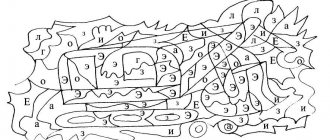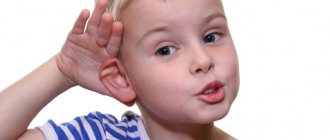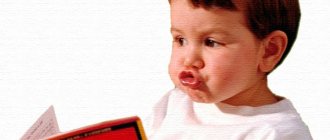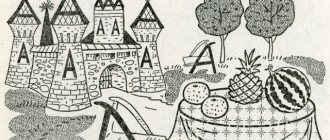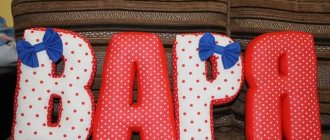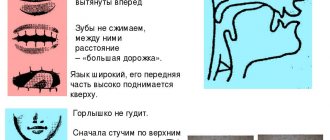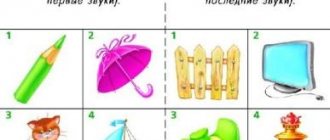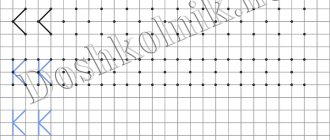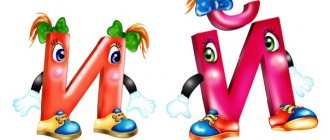Literacy training “Sound [e] and letter E”
Guess the riddle... Lives without a body, Speaks without a tongue. Nobody sees him, but everyone hears him.
That's right, it's an echo. What is an echo?
An echo is like a reflection in a mirror. Only the image is reflected in the mirror and we see it. And an echo is a reflection of sound, and we hear it. The sound is reflected from any obstacle that comes in its way (from walls, mountains, trees). The echo can be heard in an empty room, in the mountains or in the forest.
For example, in an empty stadium. It is worth shouting something, and having reflected from the concrete steps of the stands, this sound will return many times in the form of an echo. The interesting thing is that the echo will only occur when the stands are empty. If there are a lot of fans sitting on them, there will be no echo, because the sound will not be reflected, because people and their clothes will simply absorb the sound.
The same thing happens in an empty room. As long as there is no furniture or things in it, sound is easily reflected by the walls. But as soon as we put cabinets and chairs there, bring things in, the echo disappears.
Echo often helps a person in many matters. There is such a device - an echo sounder , which is most often installed on ships. It makes sounds underwater, sends them to the sea or ocean, and itself receives the reflected echo. An echo sounder simply measures the depth of the seabed while the vessel is moving. It helps sailors avoid collisions with shoals and reefs.
With the help of radio echo, sailors with special instruments notice treacherous icebergs at a great distance even in the dark, detect enemy submarines in time and sneak up on their ships.
(Based on materials from https://baby-child.ru)
That’s right, the sound [e] is a vowel, it can be sung (the tongue, lips and teeth do not interfere with the free passage of air).
1. Clap your hands if you hear the sound [e] .
Screen, floor, cocoa, tree, skirt, willow, woodpecker, popsicle, eureka, water, brush, this, book, elevator, excursion, electricity, sofa, era, echo, unit, if, children.
2. Find the extra word in the series (by the presence or absence of the sound [e] ):
bus, echo, orange, watermelon; this is an echo, Edik, a mustache.
3. I gra “Who is bigger?”
Think of as many words as possible with the sound [e].
ANSWER: eucalyptus, equator, sketch, etc.
4. Game “Syllable Auction”
Continue the words.
es... (-kiz), esta... (-feta), aero... (-drom), po... (-et), do... (-et).
5. Game “Rhyme”
Think of a rhyme for the word floor.
Answer: hut, jumble, installation, landscape, drainage.
6. Say the word
He rushes over long distances without delay; It is written at the end with two C. It is called... (express)
* * *
To distant villages, cities Who walks on the wires? Serene Majesty, This is... (electricity).
***
On a splinter, in a piece of paper, In a chocolate shirt, It just begs to be picked up. What is this?.. (Eskimo)
* * *
It hooted, it hooted, It hooted and cried, And burst into laughter, And it was called... (echo)
7. Reading G. Yudin’s story “Excavator Operators” (Remember as many words as possible with the sound [e] .)
EXCAVATORS
Yesterday Edik ran up to me from the fifth floor.
- Throw away your labels! - shouts. — We have a real escalator in our yard!
I speak:
— An excavator, probably, escalators are only in the subway.
We ran out into the yard, and there was actually an excavator standing there. The engine is running, but the excavator operator has gone somewhere. We slowly climbed into the cabin. And Edik took it and accidentally touched some hand. The excavator suddenly jerks and starts moving! And ahead is an electric pole. Excavator on this pillar - rrr! Pillar on its side - two! And all the wires broke. In our entire house the electricity immediately went out and electric irons, refrigerators, vacuum cleaners, televisions and everything that was powered by electricity stopped working.
Then the excavator operator came running, shouted and kicked us out of the cab. And in the evening dad came and... Well, I’m not at all interested in remembering this.
- Name the words that you remember with the sound [uh] ...
- What safety rules do you know...
8. Verbal experiment.
— We bought a lot. (popsicle). What can we treat our friend to?... Eskimo.
We ate one thing... (popsicle). We ate a lot of… popsicles. There are many unchangeable words: coffee, coat, Pinocchio.
This is the letter E ...
The letter E opened its mouth: it was either yawning or singing. ( O. Hoffman)
What else does the letter E look like?
The letter E on S marvels,
It's like looking in a mirror.
There is definitely a resemblance
There's just no language. (A. Shibaev)
9. Use a yellow pencil to paint over all areas with the letter E.
10. Game “Magic chain”
1. Turn a floor into a home:
Answer: Floor – heat – watermelon – tooth – side – code – house.
2. Make chains of words in which all words contain the letter “e”.
Elastic – canape – screen.
Electric – canoe – express – figurine – airfield – macrame – era – aloe – crew.
3. Who will turn the echo into a chorus in a few moments?
Answer: echo - ear - ear - hurray - sconce - boa - boron - choir.
11. Game “Find the word”
- Whatnot - floor, river, arch.
- Elastic – eraser, whale, teak, flipper.
12. Game “Complete the word”
Eta (floor), crane (screen), press (express), bale (crew), sport (export), coupon (standard), strada (stage), floor (Hermitage).
13. Game “Puzzle – Echo”
Champion cook buckwheat clamp
Take a closer look at these words and answer the following questions:
- What flower was awarded to the champion?
- What dish did the cook prepare?
- What is the name of the water stream where buckwheat grows?
- Where did you throw the clamp?
Answer: peony, ear, river, pool.
14. Game “Typesetter”
Make words from the letters of the word electric locomotive.
Answer: ditch, cart, gaze, age, lion, call, body, summer, current, etc.
15. We are writing...
16.
Dictionary
- A tow truck is a specially equipped vehicle that is designed for loading, unloading and transporting cars in the event of a breakdown or accident.
- Evacuation is the organized removal of the population, institutions, etc.
- Eucalyptus are evergreen trees, often reaching a height of 100 m.
- Evolution is the development of nature.
- Eureka
- (Greek "I have found") - an exclamation when discovering something new. - An egoist is a person who is overly concerned about his own benefit, gain, and puts his own interests above the interests of other people.
- The equator is an imaginary line that passes through the center of the globe and divides it into two hemispheres: northern and southern.
- An equilibrist is a circus performer who is able to maintain balance on a wire, rope, etc.
- An exam is a test of knowledge, a test in some academic subject.
- An instance is a separate item from many similar items; sample.
- Exoticism - bizarre, unusual features (of nature, customs, art, etc.) of distant countries.
- The crew is the crew of the ship.
- Ecology is the
science of the relationships between organisms and communities among themselves and with the environment. - Economics is
the science that studies how people use their resources for their needs . - An excursion is a visit to a museum, attraction, exhibition, etc.; a trip, a walk for some purpose.
- An expedition is a journey for scientific or military purposes.
- Experiment - experience, research.
- An expert is a specialist.
- Exploitation - use, benefit.
- An exhibit is an item put on display in a museum or exhibition.
- Express - train, bus and other vehicles for traveling long distances with increased speed and fewer stops.
- The elite are the best representatives of society.
- An emblem is a symbol with a specific meaning.
- Emotion is a mental experience, feeling.
- An episode is an incident.
- The standard is an exact measure
- Etiquette is the norms and rules of behavior of people in society.
- Etymology is the science that studies the origin of words.
I recommend reading:
- 77 Effective Educational Techniques
- Mathematics Olympiad (2nd grade)
- Interesting...Great people who changed the world
- Children's competitions and games_8
Tags: Online Russian language reading
Corrective and developmental tasks.Teach the child to identify a word from a series that differs from the rest in syllable structure.
Learn to distinguish between animate and inanimate objects, learn to ask appropriate questions: who is this? What is this?
Teach your child to clearly pronounce the sound [E].
Exercise your child in pronouncing words with a complex syllable structure.
Learn to read sentences, observing narrative and interrogative intonation.
Teach your child to reflect interrogative and narrative intonations in writing using a period and a question mark.
Task 1. An adult pronounces a series of layers, and the child listens carefully and names a word that differs from the others in its syllabic structure:
poppy - bak - so - banana;
catfish - com
- turkey -
house;
lemon - carriage - cat -
bud;
poppy - cancer - broom - tank.
Task 2. Introducing the sound [E]. Guess the riddle, name the first sound in the answer:
Lives without a body
Speaks without tongue.
Nobody sees him
And everyone hears. (Echo)
An adult shows in front of a mirror and explains to the child the articulation of the sound [E]:
- lips in a smile;
- teeth are close together;
- the wide tip of the tongue touches the lower teeth, the back of the tongue is raised;
— the neck “works.”
Sound symbol [E]: the girl reproachfully says to the kitten: “EEE...”
Characteristic
sound [E]: the sound [E] is a vowel, it can be sung (the tongue, lips and teeth do not interfere with the free passage of air). Designation: red circle.
Task 3. Phonetic exercise.
What do fishermen say when a fish gets off the hook? “Uh...h!”
Task 4. Didactic exercise “Clap your hands if you hear the sound [E}”:
uh, ah, uh, y, oh, uh...; eh, ah, uh, eh...; Emma, Anna, Edik, echo, Olya.
Task 5. Repeat after the adult a series of syllables:
pte-kte-bde-where; kte-bde-gde-pte.
Task 6. Find the extra word in the series (by the presence or absence of the sound [E]):
bus, echo,
orange, watermelon;
this is an echo, Edik, a mustache.
Task 7. Remember the names of people starting with the sound [E] (Ella, Edik, Edward, Eleanor, Emma).
Task 8. From a number of drawn objects, choose those whose names contain the sound [E].
Task 9. Speak to the child, syllable by syllable, words that have a complex syllabic structure, explaining to him the meaning of these words. Divide words into syllables. Find the longest and shortest word. If possible, make a sentence with each word:
tightrope walker, squadron, electric welder, electric locomotive, electric iron, guide, electrician, crew, electrical appliance, eucalyptus, elevator.
Task 10. Explain to the child that all animate objects answer the question: who is this?
and inanimate objects - to the question:
what is this?
Learn to ask questions about animate and inanimate objects.
Continue the series:
Who is this? This is a girl, a cat, a dog...
What is this? This is a car, a table, a jacket...
Didactic game “Odd Four” (based on whether objects are animate or inanimate):
car, plane, table, grandfather;
crow, nightingale,
chair,
cow.
Task 11. Introducing the letter E.
The letter E opened its mouth:
Either he yawns or he sings.
O. Hoffman
What else does the letter E look like?
The letter E from fingers: the thumb and index finger of the right hand form a semicircle, and the index finger of the left hand forms the “tongue” of the letter E.
Letter games.
Task 12. Independent sound-syllable analysis of the word Edik:
drawing up a diagram of circles; laying out letters in a cut alphabet, reading, copying.
Reading sentences using interrogative and narrative intonation. Recording sentences under dictation with the help of an adult, reflecting interrogative and narrative intonation in writing (using a period and a question mark).
Who is this? It's a cat. Who is this? This is Edik. Who is this? This is a fly.
MAGAZINE Preschooler.RF
Summary of a lesson on speech development Topic: “Sound and letter E”in the senior group of MBDOU kindergarten No. 42 “Mammoth .
Educator: Vasilyeva Sakhayana Petrovna
Program content:
- contribute to the development of sound-letter analysis
- promote the development of phonemic hearing
- introduce the vowel sound E and its symbol - red square
- learn to determine the place of a sound in a word and designate it on a diagram using a symbol
- introduce the letter E using a sample
- learn to write the printed letter E using a sample
- consolidate the ability to correlate sounds and letters, write the vowels A, O, U, Y
- learn to understand a learning task and complete it independently
- develop the skill of self-control and self-esteem.
I'm playing the game "Finish the Sentence"
- Complete the sentence with the correct word
Ice cream on a stick is called... (popsicle)
This house has five... (floors)
The plane landed at ... (airfield)
- Name the first sound in the words popsicle, floor (E)
— Is there an E sound in the word airfield? (Yes)
- Where is he located? (In the middle)
- Draw a red square in the diagrams - where this sound is in the name of the object.
Then I give the task on the sheet:
— The letter E is written in the left corner, and in the right is its comic image.
— I’m reading a poem by I. Blyumkin
With electricity, friends, You need to be careful, Because, like a snake, It can bite.
Assignment for children
- write the letter E first by dots, and then by yourself.
I conduct physical education at the request of the children.
I’m playing the game “Write it correctly .
I read I.A.’s poem to the children. Guseva
What sounds - Like songs, There are no obstacles on the way. Vocalists as artists
Name them in words.
Tasks and questions for children:
—What sounds are talked about in the poem? (About vowels)
— Identify the first vowel sound in the names of the drawn objects and write the corresponding letter in the square.
— What is the vowel sound in the word bull? (s)
— Write the letter Y in the square.
Note. I remind the children that in the Russian language there are no words that begin with the sound Y.
I'm playing the game "Who's More" .
Assignment for children:
- Name words with given sounds (A, O, U, Y, E)
A: watermelon, bus, pear, bunny, hat, orange, stork, aquarium, asters.
A: donkey, umbrella, coat, wasps, knife, kidneys, daughter, autumn, lake.
U: iron, snail, frog, student, bow, beetle, fly, duck, ear, lesson.
S: smoke, lynx, cheese, skis, fish, mouse, soap, pumpkin.
E: screen, floor, excavator, echo, express, electricity, airfield.
At the end of the lesson we analyze the work.
| Next > |
